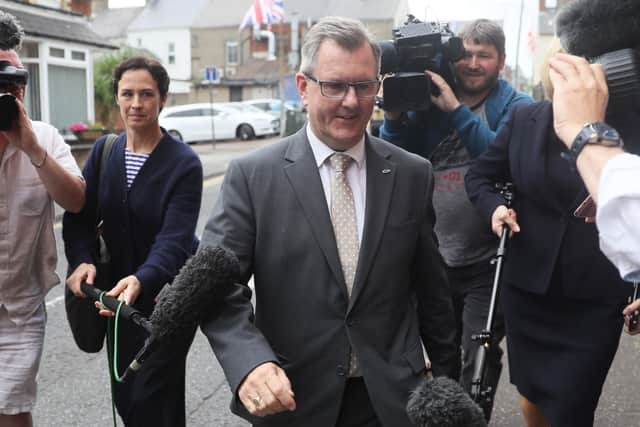DUP hierarchy seeking swift process to replace Edwin Poots as leader
and live on Freeview channel 276
The DUP is looking for a new leader only three weeks after Mr Poots was formally installed in the top job of the largest party in Northern Ireland.
The Lagan Valley MLA tendered his resignation on Thursday evening after simmering concerns over his faltering leadership escalated into a full blown internal revolt.
Advertisement
Hide AdAdvertisement
Hide AdThe dramatic development was prompted by his decision to press ahead with reconstituting Stormont’s powersharing Executive alongside Sinn Fein, despite a significant majority of his MPs and MLAs being vociferously opposed to the move.


At a heated three-hour crisis meeting of party officers at DUP headquarters in Belfast on Thursday evening, Mr Poots was presented with little alternative other than to end his brief but tumultuous tenure as leader.
The DUP’s Westminster leader Sir Jeffrey Donaldson, who narrowly lost out to Mr Poots in last month’s leadership contest, is the overwhelming favourite to succeed him.
The ousting of former leader Arlene Foster in April – in a coup instigated by supporters of Mr Poots – laid bare deep internal divisions within the once rigidly disciplined party.
Advertisement
Hide AdAdvertisement
Hide AdThose wounds were further exposed during last month’s bruising leadership campaign – the first in the party’s history – and they continue to fester.
Mindful of the need to return some degree of stability to the listing party, the DUP hierarchy is keen to address the leadership issue swiftly.
“We need to move quickly,” one senor figure told the PA news agency.
Edwin Poots leaving the Assembly chamber after nominating Paul Givan, bottom right, as First Minister hours before resigning as DUP leader (Brian Lawless/PA)
Advertisement
Hide AdAdvertisement
Hide AdWhile Lagan Valley MP Sir Jeffrey has yet to formally declare an interest, and it remains to be seen whether any of his colleagues will consider a run, many within the DUP are hoping to avoid another potentially divisive contest, instead preferring the next leader to be appointed unopposed.
Anger at a UK Government pledge to grant Sinn Fein a key concession on Irish language laws was behind the internal opposition to Mr Poots’s decision to nominate a First Minister to lead the administration alongside the republican party.
The departure of Mr Poots has now plunged powersharing back into uncertainty, only 24 hours after Paul Givan and Sinn Fein deputy First Minister Michelle O’Neill assumed office together.
Serious question marks now hang over the future of Mr Givan, who has long been closely aligned with his constituency colleague Mr Poots.
Advertisement
Hide AdAdvertisement
Hide AdThe 39-year-old remains as First Minister for the time being but it would appear unlikely that a new DUP leader would ultimately pass up the chance of making his own appointment to the position.
The latest political crisis at Stormont forced the cancellation of Friday’s planned meeting of ministers from the Northern Ireland Executive and Irish Government in Armagh.
Mr Poots will remain in position until a new leader is appointed.
In his resignation statement, he said: “This has been a difficult period for the party and the country and I have conveyed to the chairman (Lord Morrow) my determination to do everything I can to ensure both unionism and Northern Ireland is able to move forward to a stronger place.”
Advertisement
Hide AdAdvertisement
Hide AdA Sinn Fein/DUP stand-off over the Irish language issue came to a head this week as a result of the administrative process required to reconstitute the Executive following the resignation of Mrs Foster as First Minister.
The joint nature of the office Mrs Foster shared with deputy First Minister Ms O’Neill meant her departure automatically triggered the removal of Ms O’Neill from her position – as one cannot hold post without the other.
Failure to fill either of the roles within a seven-day time window would have collapsed the Executive, handing the Government the legal responsibility to call a snap Assembly election.
Sinn Fein had made clear it would not nominate a deputy First Minister until it received assurances that language laws committed to in the 2020 New Decade New Approach deal that restored powersharing would be implemented this Assembly mandate.
Advertisement
Hide AdAdvertisement
Hide AdWith Mr Poots declining to give that assurance, the Irish republicans urged the UK Government to intervene and pass the laws at Westminster instead.
The legislation would enshrine protections for Irish speakers in Northern Ireland society, ensuring oversight of how public bodies provide services in the language.
While the laws contain similar provisions for the Ulster Scots culture, the legislation has always been viewed as a top ticket item on the wish list of republicanism.
DUP politicians had strongly warned against Government intervention on such a sensitive devolved issue.
Advertisement
Hide AdAdvertisement
Hide AdHowever, Northern Ireland Secretary Brandon Lewis announced on Thursday that the Government would move to pass the laws in October, if the Executive had failed to bring them before the Assembly in the interim.
Mr Poots’s decision to accept the terms of that arrangement, and proceed with nominating Mr Givan as First Minister, enraged his party colleagues, who characterised it as caving to “ransom” politics by Sinn Fein.
An overwhelming majority of DUP MPs and MLAs voted against the move in a fractious party meeting that took place in Stormont in the hour before the nominations were confirmed at a special Assembly sitting.